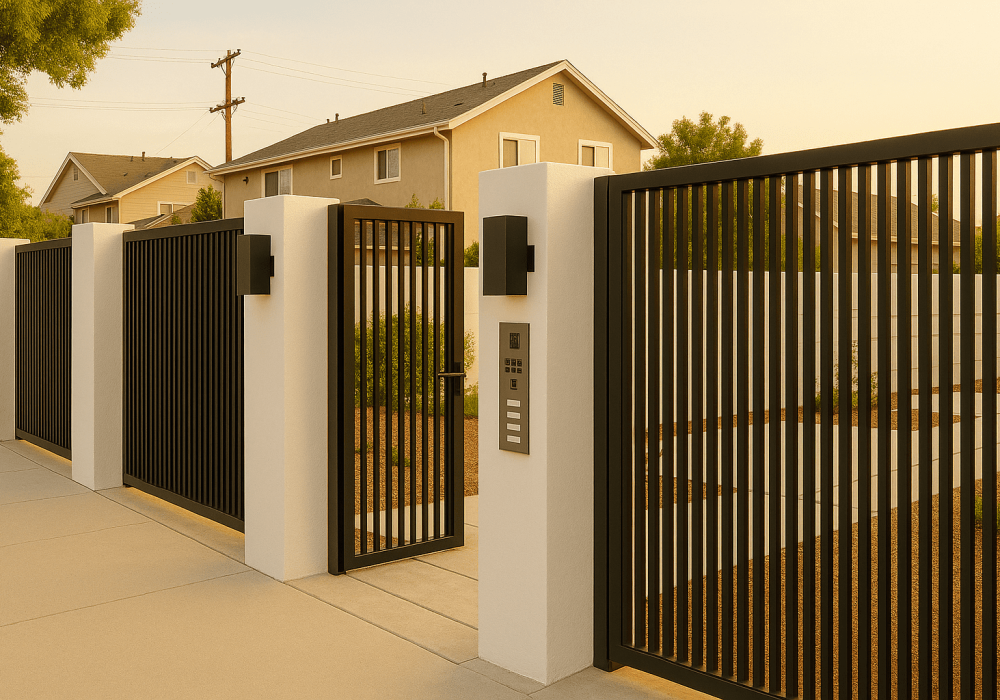Finding the perfect fence company in Los Angeles can feel like searching for a needle in a haystack. With countless contractors claiming to be the best, how do you separate the wheat from the chaff? Whether you’re looking to enhance your property’s privacy, security, or curb appeal, choosing the right fencing contractor is crucial for a successful project.
Los Angeles homeowners face unique challenges when it comes to fencing projects. The city’s diverse neighborhoods, varying regulations, and Mediterranean climate require specialized knowledge and experience. That’s why we’ve compiled this comprehensive guide to help you navigate the process of finding a reliable, skilled fence company that meets your specific needs.
Why Choosing the Right Fence Company Matters
Your fence is more than just a boundary marker – it’s an investment in your property’s value, security, and aesthetic appeal. A poorly installed fence can become a costly headache, leading to repairs, replacements, and potential safety issues. On the flip side, a professionally installed fence by a reputable company can last decades while adding significant value to your home.
The Los Angeles market is saturated with contractors of varying skill levels. Some are seasoned professionals with decades of experience, while others might be new to the business or lack proper credentials. The difference between these contractors can mean the difference between a fence that stands strong for years and one that falls apart after the first Santa Ana winds.
When you choose the right fence company, you’re not just buying materials and labor – you’re investing in expertise, reliability, and peace of mind. Professional contractors understand local building codes, permit requirements, and the best materials for Southern California’s climate conditions.
1. Start with Online Reviews and Testimonials
In today’s digital age, online reviews are your first line of defense against subpar contractors. But not all review platforms are created equal, and knowing how to read between the lines can save you from costly mistakes.
Google Reviews vs. Yelp Reviews
Google Reviews often provide a broader picture since they’re integrated with local search results. Look for companies with consistently high ratings and recent reviews. Pay attention to how contractors respond to negative reviews – this shows their commitment to customer satisfaction.
Yelp Reviews tend to be more detailed and often include photos of completed projects. However, be aware that some businesses have complicated relationships with Yelp’s review filtering system.
What to Look for in Reviews
Don’t just focus on the star rating. Read the actual content of reviews, looking for mentions of:
- Timeliness and punctuality
- Communication throughout the project
- Quality of materials used
- Cleanliness of the worksite
- Problem resolution skills
- Final results and customer satisfaction
Red flags in reviews include consistent complaints about delays, poor communication, substandard materials, or contractors who disappear mid-project.
2. Verify Licensing and Insurance Requirements
California requires most fence contractors to hold proper licensing, and Los Angeles has specific requirements that legitimate companies must meet.
Contractor License Verification
Visit the California State License Board website to verify any contractor’s license status. A valid contractor’s license ensures the company has met minimum competency requirements and carries proper insurance. Don’t work with unlicensed contractors – it’s not worth the risk.
Insurance Coverage Details
Reputable fence companies carry both general liability insurance and workers’ compensation coverage. General liability protects your property in case of accidental damage, while workers’ comp protects you from liability if someone gets injured on your property during the project.
Always ask to see current insurance certificates before signing any contracts. A legitimate company will provide these documents without hesitation.
3. Examine Their Portfolio and Previous Work
A picture is worth a thousand words, and a fence company’s portfolio tells the story of their capabilities and craftsmanship. Professional contractors should have extensive photo galleries showcasing various fence styles, materials, and challenging installations.
Look for diversity in their work – can they handle different materials like wood, vinyl, aluminum, and chain link? Do they show projects similar to what you have in mind? Pay attention to details like straight lines, consistent spacing, and proper gate installation.
Don’t be afraid to ask for references from recent projects. Speaking directly with previous customers can provide insights that photos alone cannot convey.
4. Understand Material Quality and Options
Not all fencing materials are created equal, especially in Los Angeles’s unique climate. The best fence companies work with high-quality suppliers and can explain the pros and cons of different material options.
Climate Considerations for Los Angeles
Southern California’s weather presents specific challenges:
- UV exposure can fade and weaken certain materials
- Occasional heavy rains require proper drainage considerations
- Santa Ana winds demand sturdy installation techniques
- Drought conditions affect wood expansion and contraction
A knowledgeable contractor will recommend materials and installation methods that account for these factors.
Material Options and Longevity
Quality fence companies offer various materials and can guide you toward the best choice for your specific situation:
- Vinyl fencing offers low maintenance and UV resistance
- Aluminum fencing provides durability and security
- Wood fencing offers natural beauty but requires maintenance
- Chain link provides security at an economical price point
5. Get Detailed Quotes and Compare Estimates
Never settle for a verbal estimate or a figure scribbled on the back of a business card. Professional fence companies provide detailed, written estimates that break down materials, labor, permits, and any additional costs.
What Should Be Included in a Quote
A comprehensive estimate should include:
- Detailed material specifications and quantities
- Labor costs broken down by task
- Permit fees and administrative costs
- Timeline for project completion
- Warranty information
- Payment terms and schedule
Red Flags in Pricing
Be wary of estimates that are significantly higher or lower than others. Extremely low bids often indicate corners will be cut on materials or workmanship. Unreasonably high estimates might suggest the company doesn’t want the job or is trying to take advantage of uninformed customers.
6. Evaluate Communication and Customer Service
How a company communicates during the sales process is often indicative of how they’ll handle your project. Professional fence companies respond promptly to inquiries, show up on time for appointments, and provide clear, detailed information about their services.
Initial Contact Experience
Pay attention to:
- Response time to your initial inquiry
- Professionalism of phone interactions
- Punctuality for scheduled appointments
- Preparedness during site visits
- Clarity of explanations and recommendations
Project Communication Standards
Ask potential contractors about their communication practices during projects:
- How often will they provide updates?
- Who will be your primary point of contact?
- How do they handle change orders or unexpected issues?
- What’s their policy for weather delays or other setbacks?
7. Understand Timeline and Project Management
Realistic timelines are crucial for planning your project and managing expectations. Experienced fence companies can provide accurate timeframes based on project scope, permitting requirements, and current workload.
Factors Affecting Project Timelines
Several factors can impact your fence installation timeline:
- Permit approval processes
- Weather conditions
- Material availability
- Complexity of the installation
- Contractor’s current workload
Professional companies build buffer time into their schedules to account for these variables.
Project Management Approach
Ask about their project management processes:
- Do they have dedicated project managers?
- How do they coordinate with subcontractors?
- What’s their approach to site preparation and cleanup?
- How do they ensure quality control throughout the project?
8. Investigate Warranty and After-Service Support
A company’s warranty policy speaks volumes about their confidence in their work and materials. Reputable fence companies offer comprehensive warranties covering both labor and materials.
Types of Warranties to Expect
Look for companies that offer:
- Workmanship warranties covering installation quality
- Material warranties from manufacturers
- Structural warranties for posts, gates, and framework
- Finish warranties for paint, stain, or coating applications
After-Installation Support
Quality fence companies don’t disappear after installation. They should offer:
- Prompt response to warranty claims
- Maintenance guidance and tips
- Repair services for damage or wear
- Seasonal maintenance programs
9. Consider Budget and Overall Value
While cost is certainly a factor, the cheapest option rarely provides the best value. Focus on the overall value proposition, considering quality, durability, warranty, and service.
Understanding True Project Costs
Consider the total cost of ownership, including:
- Initial installation costs
- Ongoing maintenance requirements
- Expected lifespan of materials
- Potential repair costs
- Impact on property value
Financing Options
Many reputable fence companies offer financing options to help manage project costs. Ask about:
- Payment plan availability
- Interest rates and terms
- Credit requirements
- Down payment expectations
10. Avoid Common Red Flags and Scams
Unfortunately, the construction industry attracts its share of unscrupulous operators. Knowing the warning signs can protect you from costly mistakes and substandard work.
Door-to-Door Solicitation
Be extremely cautious of contractors who show up uninvited at your door. Legitimate fence companies rarely use door-to-door sales tactics. These contractors often use high-pressure sales techniques and may not be properly licensed or insured.
Unusually Low Bids
If a bid seems too good to be true, it probably is. Extremely low estimates often indicate:
- Use of substandard materials
- Cutting corners on installation
- Hidden costs that appear later
- Possible scam operations
Cash-Only Requests
Legitimate businesses accept various payment methods. Be suspicious of contractors who insist on cash-only payments or request full payment upfront.
No Written Contracts
Never proceed with any contractor who won’t provide a detailed written contract. Verbal agreements provide no protection and are difficult to enforce.
Making Your Final Decision
After researching multiple companies, checking references, and comparing quotes, you’ll need to make your final decision. Consider all factors, not just price, and trust your instincts about which company you feel most comfortable working with.
Decision-Making Criteria
Prioritize companies that offer:
- Proper licensing and insurance
- Positive customer reviews and references
- Detailed, professional estimates
- Clear communication and customer service
- Appropriate warranties and support
- Reasonable timelines and realistic expectations
Final Steps Before Signing
Before committing to any fence company:
- Verify all licensing and insurance information
- Review the contract thoroughly
- Understand payment terms and warranty coverage
- Confirm project timeline and milestones
- Ensure all permits are properly handled
Companies like Fency Builders understand the importance of combining quality craftsmanship with excellent customer service, making them a valuable option to consider for Los Angeles homeowners seeking professional fencing solutions.
Conclusion
Finding the best fence company in Los Angeles doesn’t have to be overwhelming. By following these ten essential ideas – from researching online reviews to verifying licenses and insurance – you can identify contractors who will deliver quality work that stands the test of time.
Remember that the cheapest option isn’t always the best value. Focus on companies that demonstrate professionalism, use quality materials, and stand behind their work with solid warranties. Take time to check references, compare detailed estimates, and ensure clear communication throughout the selection process.
Your fence is an investment in your property’s value, security, and aesthetic appeal. Choose a company that treats it with the same importance you do. With proper research and careful evaluation, you’ll find a fence contractor who can bring your vision to life while providing the peace of mind that comes with professional installation.
Frequently Asked Questions
Q1: How long should a professionally installed fence last in Los Angeles?
A professionally installed fence should last 15-25 years or more, depending on materials and maintenance. Vinyl and aluminum fences typically last longer than wood fences in Southern California’s climate, while proper installation techniques ensure structural integrity regardless of material choice.
Q2: Do I need permits for fence installation in Los Angeles?
Most fence installations in Los Angeles require permits, especially for fences over 6 feet tall or in front yard areas. Requirements vary by neighborhood and HOA regulations. Reputable fence companies handle permit applications and ensure compliance with local building codes.
Q3: What’s the typical cost range for fence installation in Los Angeles?
Fence installation costs in Los Angeles vary widely based on materials, height, and complexity. Basic chain link fences start around $15-25 per linear foot, while premium materials like wrought iron or custom wood can cost $50-100+ per linear foot. Always get detailed quotes for accurate pricing.
Q4: How do I verify a fence contractor’s license in California?
Visit the California State License Board website (cslb.ca.gov) and use their license lookup tool. Enter the contractor’s license number or business name to verify current license status, check for complaints, and review any disciplinary actions.
Q5: What should I do if I’m not satisfied with my fence installation?
Contact your contractor immediately to discuss concerns. Reputable companies will work to resolve issues promptly. Document problems with photos and keep all communication in writing. If the contractor is unresponsive, contact your state licensing board or consider legal consultation for significant issues.
Check Our Google – Fency Builders – Best Fence Company In LA


